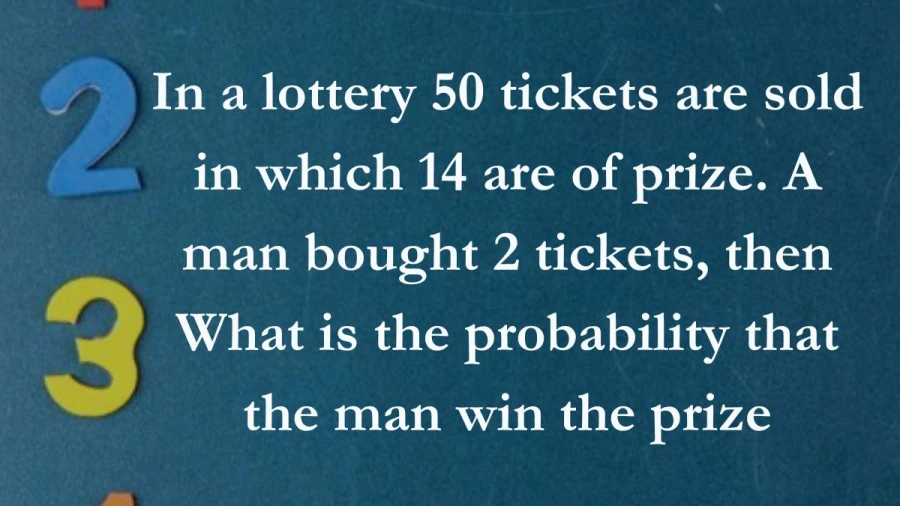If you happen to be viewing the article In a lottery 50 tickets are sold in which 14 are of prize. A man bought 2 tickets, then What is the probability that the man win the prize? ? on the website Math Hello Kitty, there are a couple of convenient ways for you to navigate through the content. You have the option to simply scroll down and leisurely read each section at your own pace. Alternatively, if you’re in a rush or looking for specific information, you can swiftly click on the table of contents provided. This will instantly direct you to the exact section that contains the information you need most urgently.
Figure out your chances of winning in a lottery with 50 tickets, where 14 are winners. Check your odds with 2 tickets.
In a lottery 50 tickets are sold in which 14 are of prize. A man bought 2 tickets, then What is the probability that the man win the prize?
The probability that the man win the prize is 17/35.
Given:
Total number of tickets = 50Number of tickets receiving prizes = 14
First, we calculate the probability of a man getting two tickets that will not receive prizes:Probability of getting two non-prize tickets (P(A)) = (Number of ways to get two non-prize tickets) / (Total number of ways to choose two tickets)P(A) = (36C2) / (50C2)P(A) = 630 / 1225P(A) = 18 / 35
Using the complementary approach,we find the probability of a man getting two tickets that will receive prizes:Probability of getting two prize tickets (P(A’)) = 1 – P(A)P(A’) = 1 – (18 / 35)P(A’) = (35 – 18) / 35 P(A’)= 17 / 35
So, the correct answer is 17/35.
What is a Probability Theory?
Probability theory is a branch of mathematics concerned with quantifying uncertainty or randomness. It provides a framework for reasoning about uncertain events or phenomena, allowing us to make predictions, decisions, and inferences in situations where outcomes are uncertain.
Key concepts in probability theory include:
-
Probability: Probability is a measure of the likelihood of an event occurring. It is typically expressed as a number between 0 and 1, where 0 indicates impossibility and 1 indicates certainty.
-
Random Variables: A random variable is a variable that can take on different values with certain probabilities. These values represent possible outcomes of a random process.
-
Probability Distributions: A probability distribution describes the likelihood of each possible outcome of a random variable. Common distributions include the normal distribution, binomial distribution, and Poisson distribution.
-
Joint, Marginal, and Conditional Probability: Probability theory deals with the probabilities of events occurring simultaneously (joint probability), the probabilities of individual events (marginal probability), and the probabilities of events given that certain conditions are met (conditional probability).
-
Expected Value and Variance: The expected value of a random variable is the long-term average value it takes on, weighted by the probabilities of each outcome. Variance measures the spread or dispersion of the values of a random variable around its expected value.
-
Probability Laws and Theorems: Probability theory is governed by various laws and theorems, such as the law of total probability, Bayes’ theorem, and the central limit theorem, which provide tools for calculating probabilities and making inferences.
-
Applications: Probability theory has applications in various fields, including statistics, finance, engineering, computer science, physics, and biology. It is used to model and analyze uncertainty in real-world systems, make predictions based on data, and design systems that can handle randomness effectively.
Probability theory provides a rigorous framework for understanding uncertainty and making informed decisions in the presence of randomness.
Thank you so much for taking the time to read the article titled In a lottery 50 tickets are sold in which 14 are of prize. A man bought 2 tickets, then What is the probability that the man win the prize? written by Math Hello Kitty. Your support means a lot to us! We are glad that you found this article useful. If you have any feedback or thoughts, we would love to hear from you. Don’t forget to leave a comment and review on our website to help introduce it to others. Once again, we sincerely appreciate your support and thank you for being a valued reader!
Source: Math Hello Kitty
Categories: Math

